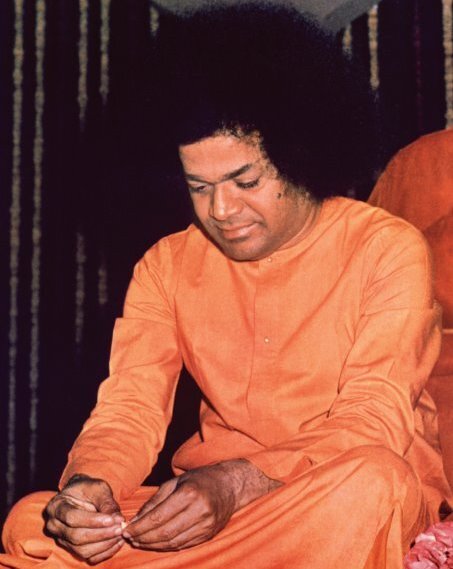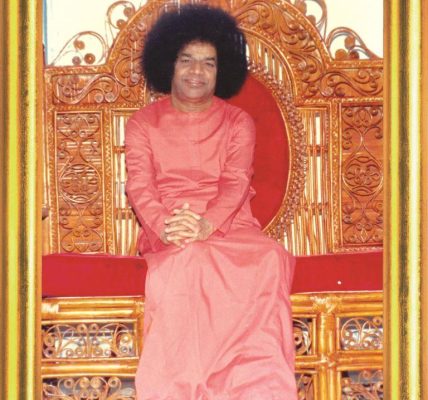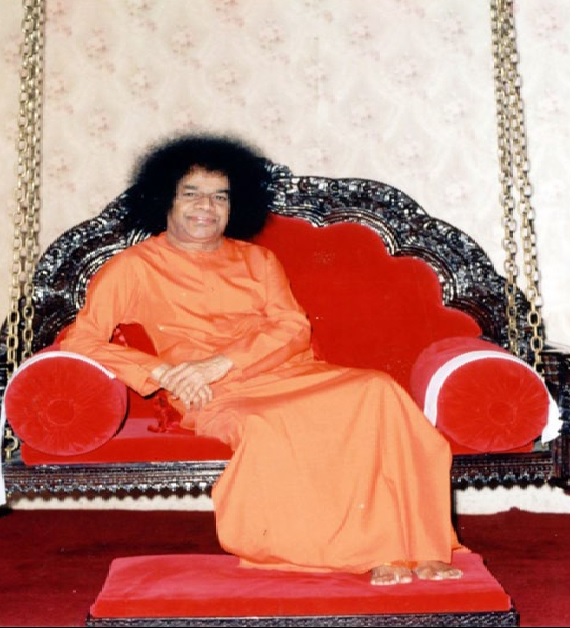By Arvind Y.
Every year on 22nd November, in the evening of the University convocation ceremony, the students of the Sri Sathya Sai Institute of Higher Learning perform a drama. The theme, generally, is a reflection of social needs, and is a synthesis of music, dance and dialogue. The story usually involves a current social situation. The protagonists draw inspiration from our ancient scriptures, lives of great people in the past, and on many occasions, from Swami himself to overcome their obstacles and attain their objectives. Hence, the drama would be a confluence of both contemporary and classical forms of portrayal. The mythological scenes would be full-fledged, with all the colors, sounds and pageantry envisioned in that period. The drama is a reflection of the ideals that the Sri Sathya Sai System of Educare stands for. Any drama is a blend of various aspects of emotion. Music, dance, histrionics, script, dialogue, screenplay, stage dynamics, sets and props and, of course, costumes. The convocation dramas of Sri Sathya Sai Institute of Higher Learning have all this and much more. The participants are blessed to receive direct guidance from Bhagawan Himself.

The process of creation of the drama begins with the theme. Bhagawan provides an outline of what the drama is to portray and identifies the specifics of the message. Every drama has a contemporary message to humanity and to be part of the process is in itself a great opportunity, blessing and more importantly, a responsibility. With Swami as the driving force things happen at unimaginable speed. The convocation drama is an experience where a participant can learn lessons of a lifetime. “Living with God is true education,” said Swami. The interactions that we have with Swami during the months leading to The Day are some of the most cherished memories that I am sure each of us will carry to our last moment. I was fortunate to be part of five convocation Dramas between 1992 and 2000. The lessons my brothers and I learnt during those wonderful days are unforgettable. Allow me to recount a few such experiences.
During those days, Bhagawan personally selected the actors, outlined the roles and prepared us. But at times Bhagawan made changes in the very characters and would change the actor accordingly. His attention to detail was truly phenomenal. In the year 1998, the drama had “Personal Transformation” as the theme. The protagonist was Mr. Kumar who, while going through personal crises, meets an old friend Rishikesh. Kumar invites his friend home and, in conversation, complains that life is unfair and finds fault with everything. Rishikesh advises Kumar that if he were to change himself, the world would appear different. Kumar argues otherwise but Rishikesh is convincing. Quoting incidents from ancient Bharath, Rishikesh brings Kumar back to the right path. This drama had scenes from the lives of Sri Ramakrishna Paramahansa, Sant Tukaram and Sant Kabir Das. Bhagawan closely watched each scene and kept making suggestions to the teachers through out.

Make God the center of your life
One day after the scene of Kabir, Swami said, “I don’t want him to be in the drama” pointing to the boy essaying the role of Sant Kabir. Swami tapped His own heart and said, “The boy has no feeling, he just delivers dialogues, let’s replace him”. The poor boy was shattered. Indeed he was doing his best, but that was not enough for Swami. His expressions did not match the feeling emanating from the song and Swami could not accept it. The boy prayed repeatedly for a reprieve but to no avail. In the interview room the next day the boy continued to pray but Swami did not relent. Pushed to the edge and the boy prayed, “Swami, please tell me what to do?”
Swami paused and fixed his gaze on the boy. ”What do you want me to tell you?” he asked. “Kabir loved God with his entire being. Love God… everything else will follow.” In the silence that followed we found asking ourselves the question. Did we really love God with all our being? It was a powerful lesson. Swami wanted us to “live the character” not just mouth dialogues. On this stage called the world, He wanted us to live the role of ideal Sai Students not be mere pretenders. And the only thing that would keep us going is our love for God. We all stared at Swami in silence. Swami’s gaze softened and he looked at the boy, “Can you do that for me?” Needless to say only the most stoic among us had a dry eye. Make God the centre of your life and the world will revolve around you.

No task is too small
Swami is particular about the minutest of details in each of His projects whether it is a Rs 700-crore water project or the costume of a character in a drama. Swami personally supervised the practice sessions. He went into the details of even hand gestures of each character, the costume that they would wear and how they would be on the stage. The best was reserved for the final day. Before the drama Swami inspected the costumes and when he came to “Narendranath Dutta”, He looked up at the towering boy and said, “Hair is not proper”. Swami reached out, picked up a comb and combed Naren’s hair! It was the gentlest of acts. A mother combing the hair of her son on the first day of school, could not have done it better. Perfection and attention to detail were the first to come to our mind but there was a greater lesson. He taught us the sanctity of action. No task is too great or too small. We realized that to do a perfect job, one would have to first let go of one own self and look beyond at the higher purpose. A single act with so much meaning!

True Leadership
I was fortunate to play the role of Mr.Kumar in this drama and as the protagonist was looking forward to presenting Swami with the welcome bouquet on the big day. But it was not to be. A couple of my other brothers received the honor. The drama was to open with the Qawwali “Sai ke durbar mein” and there I was, kneeling, the last person in the last row, on the stage in Poorna Chandra Hall, waiting for the curtain to rise. At the time, all dialogues were delivered on stage using cordless button microphones – highly sensitive, top of the line. Delivering dialogue on stage requires, complete knowledge of the script, total stage consciousness and most important – presence of mind. But now my mind was in turmoil. I had the first line of the play and I was disturbed.
Looking back I smile at myself for thinking so narrowly. I was the protagonist of a drama being staged in the Divine presence, I had been directed by Him personally. I had the best lines. I was representing the wayward man and through my transformation would be bringing back to Him the many among us who had strayed. And here I was moping that I had not given Him a bouquet. It was all I, I, I… strangely in the drama too there were similar lines. But Swami had other plans.
As we waited for the curtain to rise, we saw the curtain being moved on the far side of the stage. We all turned and found Swami on the stage. It was both unusual and surprising. For once Swami descends to take His seat beside the chief guest, He would not come back on stage till the end of the play. Yet, here He was and it appeared He was looking for someone. His gaze took in each of us and when his eyes landed on me, they lit up. He made a beeline and stopped an inch from my folded palms. He held my palms in both His hands and said softly, “Your mother was sitting at the back. I went, brought her forward and gave her a seat in the front row. I made sure she could see the drama.” He smiled, released my palms and gracefully walked off the stage. I drowned in His love and compassion. He had heard my thoughts, felt my emotions, understood my feelings and had gone out of His way to make me happy. While my brothers went to Him to offer the bouquet, HE came to me!
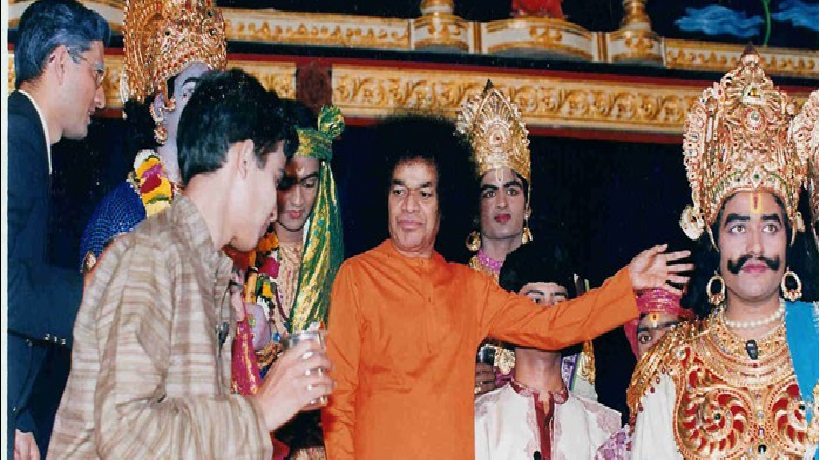
Later, after the drama, it struck me that Swami had showed the true skill of leadership through this simple act of paying attention to the right person at the right time. He had worked on me at different levels simultaneously. A smile, a touch, a word of redress when I was feeling low, and there I was doing my best to make Him proud. All it required was a little attention. True leadership lies in empathy towards one’s followers. And Swami taught me this through my own example. No other business school can compare with Bhagawan Baba’s practical education. And incidentally I was doing my MBA first year.
Be good, Do good and See good
On another occasion, Swami had granted all the ‘drama boys’ an interview. The wardens and the Vice Chancellor were also present. He began discussing the various scenes in the drama and devotion. He spoke of Meera Bai and Saint Thyagaraja in the same breath as Karanam Subbamma and Sri Kasturi. As I listened to Him, a question arose in my mind. Bhagawan was using the words Bhakti (Devotion) and Praapthi (Good fortune accrued from merit) as though they meant the same. I made bold and requested His permission to speak. He nodded and I asked.
“Swami, you have been speaking of all your great devotees. Is it Bhakti or Praapthi that brought them to you?”
Swami replied, “Without Bhakti where is Praapthi? Only when you have devotion will you be able to earn Praapthi.”
I continued, “We are all in this room today with you, Swami. Is this Bhakti or Praapthi?”
The smile faded and Swami leaned back into his chair. “Praapthi” he replied.
“Swami, I am with you now. Is it my Bhakti or Praapthi?”
Swami looked at me, His eyes boring deep into my soul, “You have Praapthi; increase your devotion?”
I got the feeling I was skating on very thin ice but could not restrain myself. I put forward the last question.
“Swami how do we grow our bhakti towards you?”
The ice cracked and I was in deep waters. Swami glared at me and in a tone that He reserved for rare occasions said, “What do you think Bhakti is? It is not a small baby that you can grow, or some art that you can learn. It has to emanate from the heart. Love for God is true devotion. When you truly love God and install Him in your heart, Good thoughts and feelings will arise.” He paused and then broke into a song that the Gopikas had sung for Lord Krishna “…On fallow land bereft of love, that the saplings of love may rise; Play thy flute, oh Lord, that it may rain the ambrosia of love…”

He paused and looked at all of us. The single glance made us very much aware of whose presence we were in.
“Love for God is the purest form of devotion. Devotion will lead to good action. Be good, do good and see good, This is the way to God,” He concluded.
At the feet of Swami we learned many a lesson, but never was any other virtue given more importance than love for God.
Timely Intervention
Dr. Sailesh Srivastav, who taught physics at the Sri Sathya Sai Higher Secondary School, was our primary liaison in the field of music. Swami would give him instructions on everything related to songs, slokas and background score. I recollect one memorable interaction. It was in the interview room in Prasanthi Nilayam. Swami was identifying the slokas that were to be recited by the Pandavas in the Vanavasa scene. He observed the expression on the countenance of Sailesh sir and abruptly said, “Don’t worry about the slokas. I will write and give you. You concentrate on the songs.” Immediately all eyes swiveled to sir, there was an expression of profound relief on his face. And true to His word on our return from Brindavan, Swami called us all in and from a school notebook tore out two pages and folding them tossed them to Sailesh sir. The pages were yellowed with age and contained the four slokas that the Pandavas and Krishna were to recite. The slokas were set to tune and each of us was asked to recite the same in front of Swami. The one Bheema was to recite translated to the following:
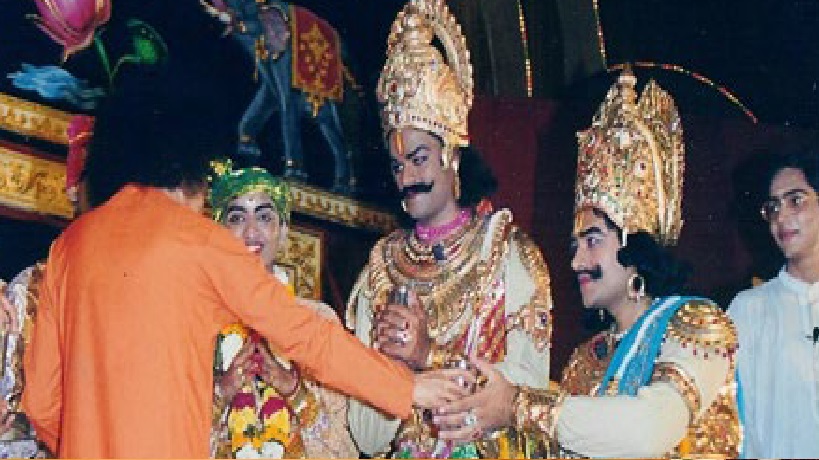
“You have united brothers who can powder hills to dust.
You have Lord Krishna as an invisible fort around you.
On the battlefield we will always be victorious,
Why are you then so obstinate? Why live in forests?
Tell us, Oh brother!”
I was unfamiliar with the recitation of slokas and I recited the poem the first time with my eyes closed. I became aware that the room was deathly silent. I opened my eyes to find everyone staring at swami wide-eyed. The kind of look one would have if he was expecting to be vaporized! I had definitely goofed up! Swami had fixed me with a stare; I gulped, expecting the worst. Suddenly Swami burst into uproarious laughter. He literally roared with laughter till tears rolled down His cheeks! The atmosphere suddenly cleared, and I realized that I had been let off the hook! I had mispronounced a word that would have brought severe censure in normal company, think of making a gaffe in the presence of Perfection! Swami, through fits of laughter, corrected my pronunciation and told the warden to watch out for further such mistakes by the other singers. Honestly, I did not know how to offer my gratitude to Swami. Had He not made light of the mistake, I would have been crucified. That is Swami in action. He forgives us but with a warning not to repeat the mistake. And as the master of circumstance, He knows when to do what and how.

Living with God is true education
Bhagawan is always ready with answers to an enquiring mind. And in the year 1999 the drama boys were in for a treat beyond their imagination. Swami would call us in every day and listen to us deliver the lines and He would personally guide us in their delivery. He had a unique message for each of us and we all benefited from that special attention. That year the practice session started early in October. Swami had chosen to bless the Brindavan Ashram at Whitefield with His presence and we all followed Him. I was blessed to play the role of Bheema Sena, the second among the Pandava brothers. There were two mythological scenes in the play both referring to the Pandavas.
One morning, as I was reading a book after morning Darshan in the institute library, I received a message that I was to meet the warden immediately. Summons such as these to a student meant different things. I knocked on the door to his office a bit worried, wondering what had gone wrong. He smiled at me as I entered the office. But that did nothing to assuage my apprehensions. “Swami wants to talk to you alone, Arvind. This afternoon be here by 12.30 we will go into Trayee together. Don’t be late.” I was so taken aback at the fantastic opportunity that I would be alone with Swami. I could just nod and say “yes sir.” “One thing,” continued the warden, “Keep it to yourself and don’t tell anyone now.”
That afternoon, I went into Trayee Brindavan. We entered through the interview room door that led to the central round hall. From there we went to the Jhula room. Swami was already seated on the Jhula, Sudheendran was seated in front slightly to Swami’s right. The other elders in the room were, Sri Gangadhar Shetty and Dr. Padmanabhan. Very small group, very private.
“Hmmm, Bheemasena, ra kurcho!” (Come and sit down, Bheemasena) said Swami conversationally.
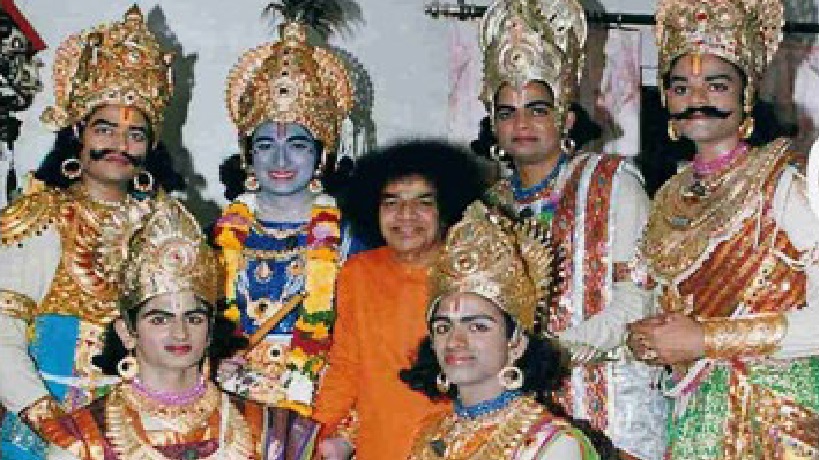
“Swami!” I said, and immediately sat down. Though outwardly calm, my heart was thumping, I could feel the pressure in my ear drums. I had never before been in such a situation with Swami. He had earlier granted me His proximity in the interviews he was so gracious to bless me with. But today was different. It felt different to me or perhaps I was just considering it different. I had no idea why I had been called in or blessed with this special audience. Thoughts were racing through my head. He turned and looked straight into my eyes – and smiled. I really don’t know or perhaps I don’t have the words to express the magic in His eyes. In a split second, my mind was washed clean. It was as though a mother had looked into her child’s eyes.
“Aemaina questions unte adugu?” said Swami. (If you have any questions ask.)
Generally, it is at times like these that the mind goes blank. But I had been reading a lot and had a lot of questions. The first question that came to my mind was: “Swami, Sathyamunaku Ritamunaku vyatysamemi?” (What is the difference between Sathyam and Ritam?)
I heard a quick intake of breath behind me, and could as well guess the reason; such a small boy asking such a big question? But Swami treated me otherwise. Age is no bar in one’s spiritual quest. Without an instant’s pause Swami replied, “Trikaala bhaadyamu Satyamu. Trikarna suddhi Ritamu.” (That which does not change with time is Sathyam, unity of thought word and deed is Ritam.)
“Which is greater, Swami?” Swami’s response emboldened me.
“Both are equally powerful, both are reflections of God”
“How Swami?” The questions flowed freely now.
“Man is made of the five elements, and is therefore limited by time. God is not limited by Time. God is Time and God is beyond Time. Ritam is cosmic order. It is a state of balance that exists independent of Time. Sathyam and Ritam are together responsible for sustenance of Srishti. Man, being part of creation, is controlled by Time. Sathyam is external truth that man can relate to in this world. Ritam is truth that is internal and only when man is able to turn all five senses inward he will be able to recognize Ritam.”
“Does that mean that Ritam comes after Sathyam?”
“Both exist always. Yes, in your spiritual journey you progress from Saakaara to Niraakara. Since the visible world is associated with Sathyam, to you it will seem that Sathyam comes before Ritam. But to me they are the same. I am beyond them.”
It is said the Sadguru is one who can place in a nutshell, the secrets of the universe. Swami is the only one in my little experience of this world who fits the description. Swami spoke in first person referring to Himself. It is rare to hear Him speak of Himself as God. But in this private conversation, in the Trayee Brindavan, to this yearning heart, Swami revealed Himself as He always is. God. He allowed me to ask Him many more questions that had been plaguing me in my journey towards Him and graciously answered all of them. Not once did He say, “This is beyond your understanding.” In fact, He took the simplest of similes and examples so that I could relate to them. An hour and a half went by like the bat of an eyelid, in this conversation with God. I was brimming with the bliss of being with Him.
“Swami darsanamunaku povali, devotees wait chestunnaru,” said Swami (Swami has to go for darshan, devotees are waiting), smiling at me apologetically as though He too was unwilling to end the conversation, but was being called away. I was astounded and could blink open mouthed in silence. The Lord of the Universe, asking me, an infinitesimal fraction of His Creation, permission? Swami taught me a great lesson – however great one may become never ever make the other person feel inferior. Respect the other person for what he or she is. They too have their dignity.
This brings to my mind the interaction we had with warden sir, in the dining hall after we came to Brindavan, a couple of days earlier. Warden sir said, “When Swami called me into Trayee and informed me that He had told Prasanthi Nilayam boys to come to Brindavan, He spoke in a way that brought tears to my eyes. You know what He said? “Puttaparthi boys naa koraku vastunnaru, vaaru boys hostel lo vundavacchuna?” (Puttaparthi boys are coming for me, can they stay in the boys hostel?) Just look at Swami. He is our Lord and Master. He might as well ordered me and I would have unhesitatingly obeyed. After all everything here is His. Why should He ask me permission? When Swami can be so humble, how much more should we be?” Living with God is indeed true education.
To whom much is given, much will be demanded
In all His messages, Swami dwells more on the good and positive aspects of life and brings in the seamier side, not just to draw a contrast, but to add value to the good. As He once said, “How will you know the value of light if you do not experience darkness?” But so strong is His love for His boys that he cannot brook even the thought of them portraying a negative character. At the end of each drama, all the characters transform and good always triumphs over evil – no exceptions. Whether it was a jealous landlord, an uncooperative boss or a finicky government licensing inspector, the characters are symbolic of the obstacles one faces in life.
For instance, in the case of Mr.Lokapati, Bhagawan changed the very tone of the character. In the drama entitled ‘Dharmo Rakshati Rakshitaha’, five young men from different backgrounds – all devotees of Bhagawan – come together to start a firm ‘Kiran Lamps’ that manufactures innovative light bulbs. Uncle Vasudevan is their mentor. They require the permission from Mr. Lokapati to start their venture. According to the original script Mr. Lokapati was to be a dishonest official and one of the five youngsters accuses him of demanding an enticement. They are counseled by their uncle and in due course Mr. Lokapati comes around, apologizes and grants the license. Good triumphs over evil.
But Bhagawan had a totally different opinion. During those days, we were most fortunate for Bhagawan would visit the practice sessions held in the college auditorium often. And one evening He sat watching the altercation between Mr. Lokapati and the youth, totally engrossed in the scene. When it came to the instance where the youth accuse the License inspector, Swami cut in abruptly.
“Stop!” He commanded in a stentorian voice. There was pin drop silence in the auditorium. His countenance was livid and we were afraid to breathe. “Lokapati is not a bad man,” He continued hotly. “He is just doing his duty. It is you people who do not have the right documents. You are over confident and do not listen to the words of your elders.” He turned to the boy portraying the role of Lokapati and lovingly said, “Good boy.”
Bhagawan knew that the rest of the drama would have to be redone and most graciously blessed us all with a Padnamaskar and told the teachers to make the modifications. Consequently, the entire drama changed, for the impetuous young men had brought it on themselves in their over-confidence. Bhagawan changed the drama from a good versus bad situation to that of introspection and evolution. Again it was an incident that was layered in message. Bhagawan could not tolerate any of His students being accused of anything nefarious, albeit in a drama. His standards of morality, honesty and integrity are unquestionable as is His faith in His students. He did not want His students to even portray a negative role. Instead, He changed the entire drama to convey the message of positive thinking and sincere effort.
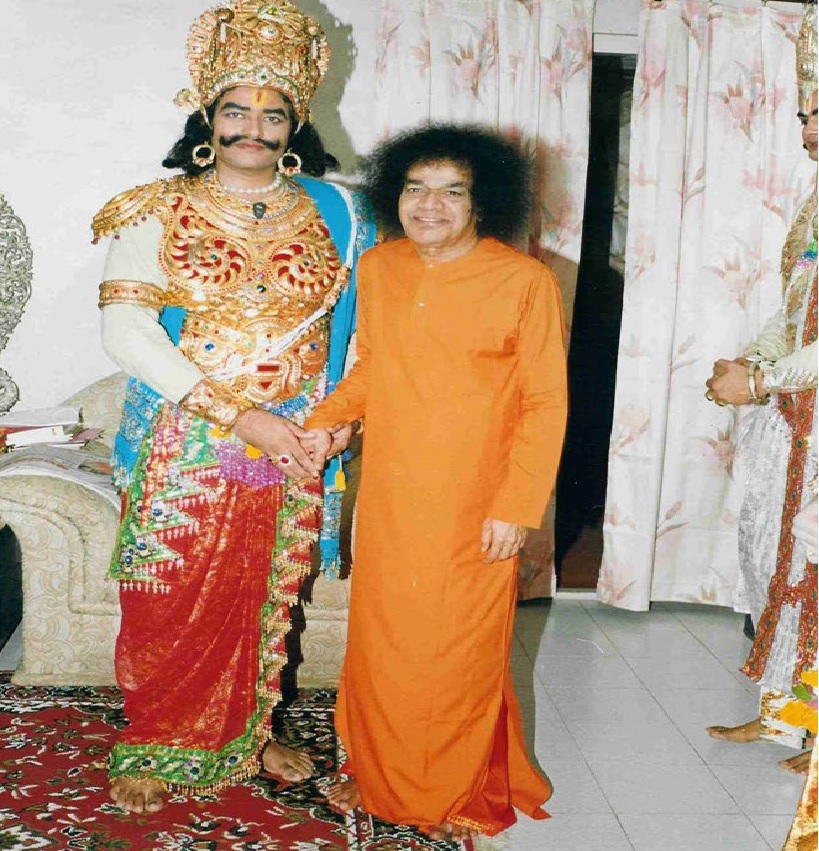
In conclusion
The convocation drama is a means to an end rather than an end in itself. True, the final performance lasts for an hour but a thousand hours lie behind it; a hundred students and teachers, of whom a fraction is on stage, all working with the single pointed goal of making Swami happy by doing their very best to His satisfaction. The drama is a project that involves many minds, hearts and hands performing their respective duties but with a single goal in mind. One would consider it a template on which one could run an organization. The sense of purpose instilled by Bhagawan is indelible. All of us participating in the annual convocation drama of Sri Sathya Sai Institute of Higher Learning are touched and transformed in more ways than one. It bears repetition to say to be part of the process is in itself a great opportunity, blessing and more important – a responsibility. To whom much is given from them much will be demanded.
———————————————
The author is an Assistant Director (Quality Assurance) at NHM (National Health Mission), Andhra Pradesh. Brother Arvind has completed B.Sc, MSc (Chemistry), MBA and Diploma in Culture and Philosophy at Sri Sathya Sai Institute of Higher Learning.

